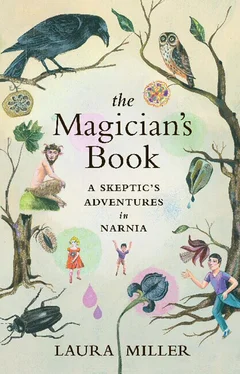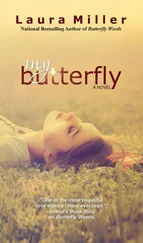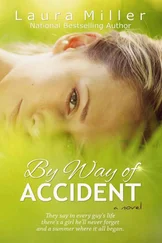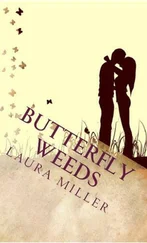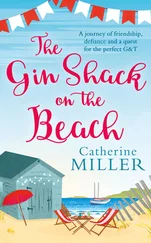But my history with Narnia is not idiosyncratic, and so I’ve also occasionally included interviews I conducted with writers and people who responded to my first essay about The Lion, the Witch and the Wardrobe, published on Salon.com. Conversations with other readers have always been essential to the growth of my own literary understanding, and I suspect this is true for most other critics as well. But for some reason convention has dictated that we seldom mention these exchanges when writing about books. I’ve tried to correct that omission here.
In the concluding volume of the Chronicles, The Last Battle, Lewis wrote of a place that “was far larger than it seemed from the outside.” Although this book will wend its way through the life and thoughts of Lewis and his friends (especially his close friend and colleague J. R. R. Tolkien), my own life and thoughts, the memories and feelings of other readers, the history and literature of Britain and of Ireland and the mythical taproots of humanity, all of this, in the end, is contained in seven children’s novels. These books are far larger than they seem from the outside, and The Magician’s Book is an attempt to explore some of their interior terrain. There is one major thematic province, however, that I will do no more than fly over: Lewis’s Christianity. Many, many other writers have dealt exhaustively with this aspect of Lewis’s work, to the point of obscuring other elements in the Chronicles, the ones that appeal to me. Lewis’s theological writings don’t interest me much, and while religion is an unavoidable subject when considering Narnia, my goal has been to illuminate its other, unsung dimensions, especially the deep roots of the Chronicles in the universal experiences of childhood and in English literature.
I am no longer young, and I can’t read the Chronicles the way I once did, with the same absolute belief. Some of what I find there still moves me profoundly, but other bits now grate and disturb. I began The Magician’s Book hoping to explain not only why but how it is still possible for me to love these books, despite the biases and small-mindedness they sometimes display, despite often feeling that I wouldn’t have much liked the man who wrote them, despite the proselytizing that most adults assume is their only real content.
I don’t believe that my appreciation amounts to mere nostalgia or a yearning for my own lost innocence. At the very least, that would be a betrayal of the child I once was. She would have had no patience with such mopey sentimentality; one of the reasons she prized the Chronicles was her belief (correct, I still think) that they educated her on the nature of evil as well as good, and that she was the better for it. I like to think that in the end, I’ve kept faith with her.
A Note on the Order of the Chronicles of Narnia
The Chronicles of Narnia have been numbered by their publishers in two different orders. The first, and the order in which I originally read them, is the order of their publication: The Lion, the Witch and the Wardrobe; Prince Caspian; The Voyage of the Dawn Treader; The Silver Chair; The Horse and His Boy; The Magician’s Nephew; and The Last Battle . In recent years, citing a letter C. S. Lewis wrote to a child in 1957, Lewis’s estate (which is managed by his stepson, Douglas Gresham) has specified that the books be numbered according to the chronological sequence of the fictional events they describe: The Magician’s Nephew; The Lion, the Witch and the Wardrobe; The Horse and His Boy; Prince Caspian; The Voyage of the Dawn Treader; The Silver Chair; The Last Battle . Feelings run high on this matter. Lewis expressed the intention of one day going back to the Chronicles to correct various problems, and perhaps he would have revised them to make the current order more consistent with the content of the books themselves. However, he never got around to this, and as is, some lines in The Lion, the Witch and the Wardrobe don’t make much sense if you presume that its readers are already familiar with The Magician’s Nephew.
Most of the people I’ve talked with about Narnia are old enough to have read the books in the original order and, like me, they can’t imagine discovering them in any other sequence, for reasons of art as well as logic. I remain unconvinced that Lewis himself had any definite opinions on the proper order in which to read the Chronicles (he was probably just being kind to his young correspondent), and even if he did, I would still recommend that they be read in the original configuration. Accordingly, throughout this book, I will discuss all seven books as if the original ordering still prevailed.
Part One
Songs of Innocence
Chapter One
The Light in the Forest
Long before I learned of The Lion, the Witch and the Wardrobe, before it was even written, a twelve-year-old girl named Wilanne Belden walked two miles once a week to the library in Cleveland Heights, Ohio, to check out the maximum quantity of five books. It was the Depression, and buying any book was a luxury. The deal Wilanne’s parents struck with her was that if she checked out the same title from the library three times, and read it from cover to cover each time, she could have a copy of her own.
This arrangement worked well enough until Wilanne discovered what would become her favorite book, J. R. R. Tolkien’s The Hobbit (then in its first edition, before even Tolkien himself knew the significance of Bilbo Baggins’s magic ring). The Hobbit is long for a children’s book, and by the time she had read it three times, it had gone out of stock in bookstores. Buying a copy was no longer an option. So Wilanne decided to make her own, checking the book out of the library over and over again, typing up a couple dozen pages at a time using two fingers on the family’s manual typewriter. She got as far as page 107 before the book returned to the stores.
There is no reader more devoted than a bookish child who has found the story that suits her perfectly. Thirty years later, Wilanne would turn me into one of those children when she handed me a slim hardcover bound in gray fabric with the image of a little stag stamped on the front, and said, “I think you’ll like this one.” It was her copy; she’d had the book for a while, but I was the first of her second-grade students that she’d tried it on. “You were a child who needed to read C. S. Lewis,” she said firmly when, not long ago, I asked her why.
“How did you know? How can you tell something like that?”
“I can’t explain. It’s just one of those things that happens.”
Even today, this intuition strikes me as slightly supernatural, in the same way that Narnia seemed to emerge, by some miracle, out of my own unspoken self. “When you brought the book back,” Wilanne remembered as we sat in her cozy apartment, surrounded by books, knitting, and cats, “You told me, and this I have always remembered, that you didn’t know that there were other people who had the kind of imagination that you did.”
Wilanne and I were not, I think, unhappy children. I grew up in a comfortable American home, in a big, intact family, with a lawyer father and a homemaker mom, and she still remembers feeling fortunate that her father had a steady job when so many others didn’t. But we were neither of us, I suspect, entirely satisfied with that.
“You were automatically one of my kids,” Wilanne said when I asked her what she remembered about first meeting me forty years ago. By this, she means one of those children “interested in the imagination and in the relationship between the real and the unreal. They are entirely capable of telling the difference between truth and falsehood, but they prefer the falsehood occasionally.” Nothing exciting had ever happened to me, was how I saw it, and I was convinced that nothing exciting ever could, as long as I was stuck in a world of station wagons and jump rope, backyard swim classes and spelling tests. Then Mrs. Belden handed me a book.
Читать дальше
